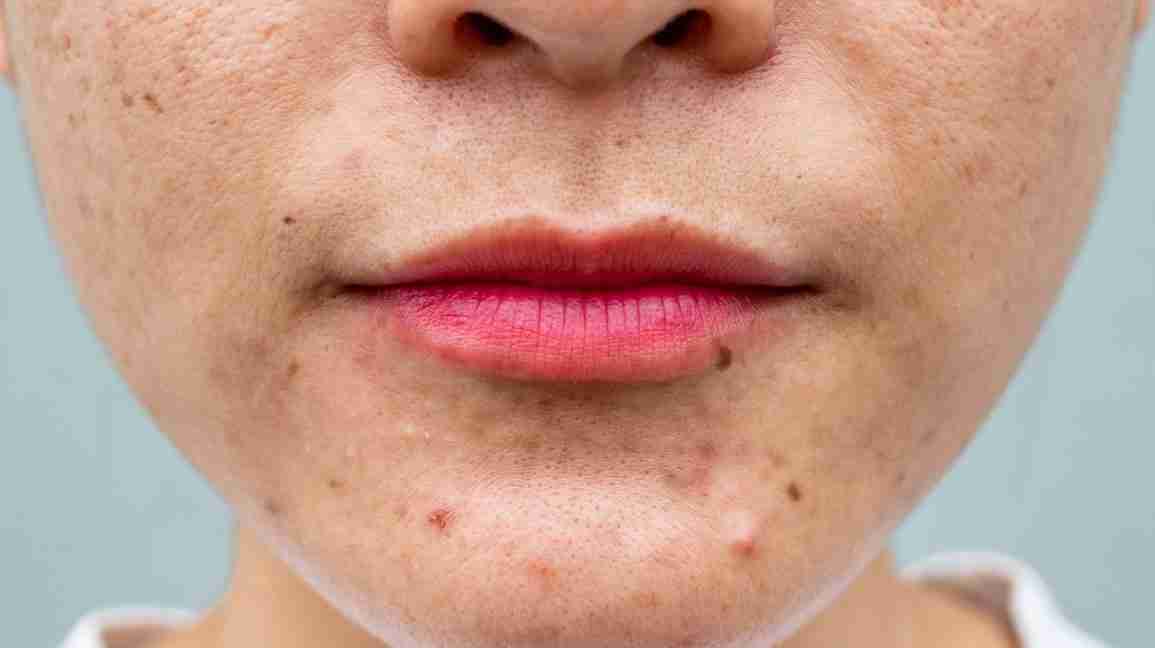Acne isn’t only a puberty problem — it can be a pregnancy and post-pregnancy problem as well. (And for the same reason — hormones.)
Although pregnancy acne usually disappears after giving birth, some women have acne that continues postpartum.
Here’s a look at why postpartum acne occurs and what you can do about it.
To be clear, developing acne during and after pregnancy is completely normal. Pregnancy causes a lot of hormonal changes, and unfortunately, some of these changes can show up on your face.
These breakouts are often due to changes in progesterone levels. Higher hormone levels increase sebum (oil) production, which can clog pores and trigger breakouts.
Progesterone is a female sex hormone made by the ovaries. This hormone builds up the lining of your uterus during menstruation. Your body also makes progesterone during pregnancy, as this hormone helps you maintain a healthy pregnancy.
After you give birth, your progesterone levels return to normal. And once this happens, hormonal acne often disappears. For some women, though, it takes longer for their hormone levels to normalize, so they continue to have acne.
Still, progesterone isn’t the only cause of postpartum acne. Adjusting to a new baby and a new routine can increase your stress levels, which can also trigger acne.
Stress doesn’t directly cause acne, but chronic stress causes your body to release a large amount of cortisol, which is a stress hormone. Extra cortisol prompts your sebaceous glands to secrete more sebum, which of course, can clog your pores and cause breakouts.
Postpartum breakouts can also occur when you’re dehydrated. Dry skin leads to increased sebum production, which can trigger breakouts.
Acne can also develop if you frequently touch your face. While it might come as a surprise, this is a common cause of breakouts, as bacteria can transfer from your hands to your face.
Postpartum acne can occur anywhere on your body, including your back and buttocks. However, it’s more likely to occur on your face (forehead, chin, and cheeks), as there are more sebaceous glands in these areas.
The good news is that postpartum acne is usually temporary. Sometimes, acne clears up almost immediately after giving birth. For others, acne continues for several weeks or months. It really depends on how long it takes for your hormone level to return to (your) normal.
Also, keep in mind that breastfeeding can also increase your hormone levels. So if you breastfeed, it might take longer for postpartum acne to disappear.
If postpartum acne continues past delivery, several options can help reduce breakouts and clear your skin.
Increasing your fluid intake and staying hydrated may naturally improve your acne. Additionally, cleansing your face and removing makeup before bed, as well as not touching your face, can make a difference. (A good nighttime skin care routine sometimes falls by the wayside when you have a newborn — but don’t forget to take care of you!)
Sometimes, though, you may need medication to treat postpartum acne. These treatment options vary depending on whether you’re breastfeeding.
Postpartum acne treatments if you’re breastfeeding
If your acne doesn’t improve after delivery and you’re breastfeeding, it’s safe to use topical acne treatments.
These include treatments that were not safe during pregnancy, such as topical retinoids, which are anti-inflammatory medications that help unclog pores. It’s also safe to use benzoyl peroxide when you’re breastfeeding. These topical acne medications function as antimicrobials and help unclog pores, too.
However, if you have acne on your chest, don’t apply topical acne medication to this area. You don’t want your baby to ingest or come into contact with the medication.
You can also use acne medications that contain salicylic acid, as well as topical antibiotics. Salicylic acid exfoliates dead skin and unclogs pores. Antibiotics, on the other hand, can kill bacteria on the skin.
If you’re breastfeeding, doctors typically recommend using topical medications as a first-line treatment for acne. Depending on the severity of your acne, your doctor may prescribe birth control pills to treat it.
Birth control pills can reduce your hormone levels, thus decreasing the amount of sebum your body produces.
Postpartum acne treatments if you’re not breastfeeding
If you’re not breastfeeding, you can use all of the topical acne treatments mentioned above — topical retinoids, benzoyl peroxide, salicylic acid, or a topical antibiotic.
Birth control pills may also curb acne. Additionally, your doctor might recommend an oral medication when topical medications don’t work.
These include:
- oral antibiotics, which can reduce bacteria and fight inflammation
- anti-androgen agents, which block androgen hormones and help reduce oil production
If your acne doesn’t respond to any of these treatments, another option is oral isotretinoin (Accutane). This is a form of vitamin A that treats severe acne, such as acne characterized by nodules and cysts.
Simple lifestyle changes can also make a difference, regardless of whether you’re breastfeeding. This includes using oil-free skin care products that won’t clog pores, along with showering after exercise or other strenuous activities.
You can also reduce acne by washing your face with mild soap twice daily and exfoliating to remove dead skin cells once or twice per week.
Some people have acne flares after too much sun exposure. If possible, limit your exposure to direct sunlight and wear sunscreen. Also, take note of whether your acne worsens after eating certain foods. Some people have an increase in breakouts after eating fatty foods, dairy foods, or acidic foods.
Related: 13 Powerful Home Remedies for Acne
See a doctor for postpartum acne that doesn’t improve with self-care. Sometimes, topical over-the-counter creams aren’t enough to treat acne. In this case, your doctor can recommend a topical prescription medication. These are stronger and often more effective.
You can also discuss whether an oral prescription medication is safe for you or your baby (if you’re breastfeeding). If you take an oral medication while breastfeeding (other than birth control pills), your doctor may recommend taking the medication after your baby’s last feed for the night.
Most pregnancy acne is mild and disappears soon after delivery. However, stubborn, persistent acne might need medication.
Use over-the-counter topical creams as a first-line treatment and make lifestyle adjustments. If your condition doesn’t improve, talk with your doctor and discuss prescription options.

